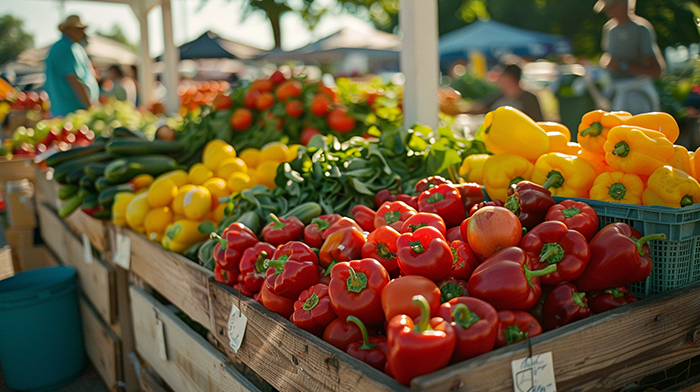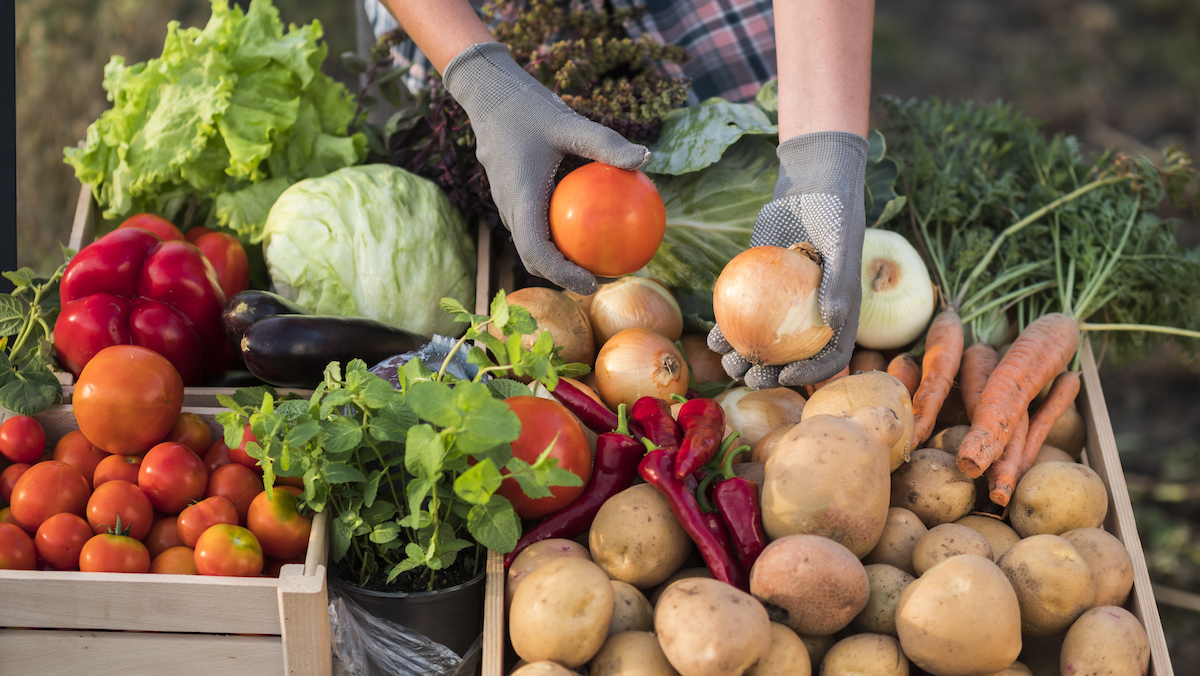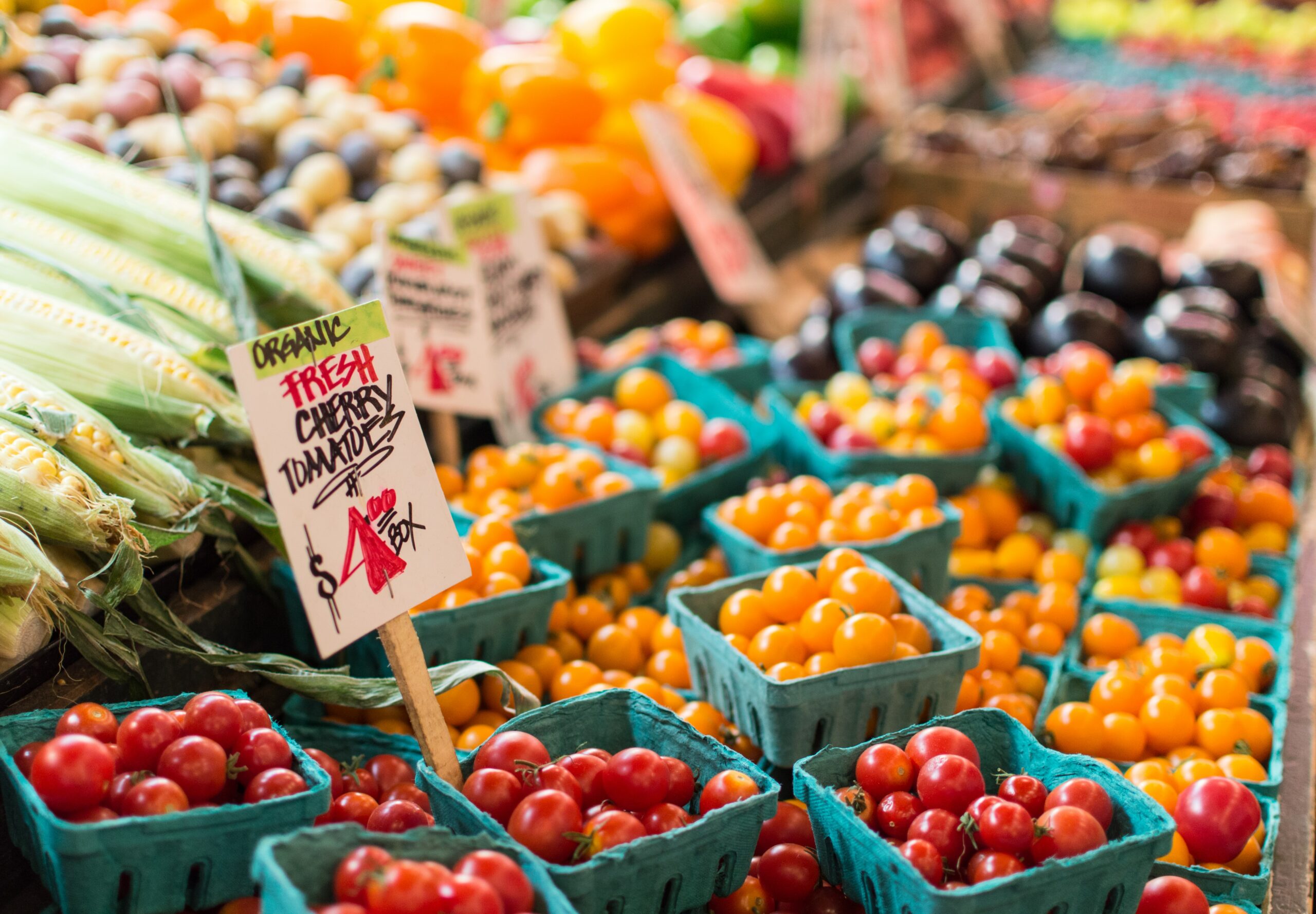
Eating local produce has gained significant attention in recent years, with people becoming increasingly aware of the advantages of supporting local farmers and consuming food that’s grown close to home.
Local produce not only benefits the environment but also improves your health, strengthens your community, and supports sustainable farming practices. Let's learn the compelling benefits of eating locally grown fruits and vegetables.
1. Improved Nutritional Value
Local produce often contains more nutrients compared to imported counterparts. This is because fruits and vegetables that are grown locally are harvested at their peak ripeness, preserving their vitamin and mineral content. Since local produce doesn't need to travel long distances, it is less likely to lose its nutritional value due to transportation and storage. Freshly harvested produce is packed with vitamins, antioxidants, and essential nutrients, making it a healthier option for consumers.
2. Supports Local Economy
By purchasing local produce, you are contributing directly to the local economy. Your money helps support small-scale farmers, local workers, and businesses within your community. Local farming operations are often family-owned and provide employment opportunities that benefit your area’s economic growth. A thriving local food system helps sustain jobs and enhances the overall economic stability of the region.
3. Reduced Carbon Footprint
One of the most significant environmental benefits of eating local produceis the reduction in carbon emissions associated with transportation. Imported produce often travels thousands of miles, resulting in substantial carbon footprints due to fuel consumption for shipping. Local food, on the other hand, travels a much shorter distance from farm to plate, significantly reducing the carbon impact. Choosing local food helps combat climate change and supports environmentally-friendly practices.
4. Fresher And Tastier
Freshly harvested local produce tends to have superior flavor compared to imported produce. This is because it spends less time in transit and is typically sold quickly after harvesting, allowing it to maintain its optimal flavor and texture. When produce is grown locally, it’s more likely to be ripe when it reaches your plate, providing a better taste and a more satisfying eating experience.
5. Seasonality And Variety
Eating local produce means you get to enjoy a wide variety of fruits and vegetables that are in season. Local food systems encourage seasonal eating, which leads to a more diverse diet throughout the year. Each season brings its own set of crops, ensuring that your meals are varied and exciting. Seasonal produce also tends to be more affordable and plentiful, as it is in abundance during its harvest period.
6. Less Pesticides And Chemicals
Local farmers are more likely to use fewer pesticides and chemicals compared to large-scale commercial farming operations. Many small-scale, local farmers prioritize organic or sustainable farming practices, ensuring that their produce is grown without harmful chemicals. When you buy local, you reduce your exposure to potentially harmful substances while supporting environmentally conscious farming practices.
7. Boosts Food Security
Local produce contributes to greater food security by reducing dependence on global supply chains. In times of crisis or during natural disasters, local food systems can be more resilient and reliable. By supporting local farmers, you help build a food system that’s less vulnerable to disruptions, ensuring that fresh, nutritious food remains available to the community.
8. Supports Sustainable Farming Practices
Local farmers often engage in sustainable agricultural practices such as crop rotation, composting, and water conservation techniques. These methods help protect the soil, conserve water, and reduce reliance on synthetic fertilizers. By choosing local produce, you are helping to support farming methods that are more in harmony with the environment.
9. Better For Biodiversity
Eating local produce supports agricultural biodiversity. Local food systems encourage the cultivation of a wide range of crops, including heirloom varieties that are often neglected by large-scale industrial farms. This preservation of diverse crops helps protect genetic diversity and supports a more resilient food system. Biodiversity in farming also benefits the ecosystem by supporting healthy pollinator populations and promoting natural pest control.
10. Strengthens Community Connections
Buying local produce fosters a sense of community. When you purchase food directly from farmers or at local markets, you develop a relationship with those who grow your food. You gain insight into the farming process and the effort behind the food you consume. This creates stronger bonds within your community and helps build trust between producers and consumers.
11. Healthier Soil And Ecosystems
Small-scale local farming practices tend to be more sustainable than industrial agriculture. These farms often prioritize soil health by using natural fertilizers and minimizing soil disturbance. Crop rotation, reduced tillage, and the use of organic practices help maintain soil fertility and reduce erosion. This results in healthier soil and ecosystems, which are crucial for long-term agricultural productivity and environmental health.
12. Reduces Food Waste
Eating local produce helps reduce food wasteby ensuring that food doesn't have to travel long distances or be stored for extended periods. Locally grown food typically has a shorter shelf life, which encourages more efficient harvesting and consumption. Additionally, smaller, local farms often have more flexibility to sell directly to consumers, reducing the chances of produce being wasted in transit or distribution.
13. Promotes Farm-to-Table Trends
Farm-to-table dining is an increasingly popular trend that emphasizes locally grown ingredients. Many restaurants now source their produce from local farms, allowing diners to enjoy fresh, in-season dishes that support the local economy. This trend is not only beneficial to the environment but also encourages a more conscious approach to eating, where consumers are more aware of where their food comes from.
14. Provides Access To Fresh Herbs And Microgreens
Local farmers often grow fresh herbsand microgreens that may be difficult to find in large grocery stores. These nutrient-dense, flavorful plants add a burst of freshness to your meals. When you buy locally, you gain access to herbs like basil, parsley, mint, and specialty microgreens that are grown nearby, improving the quality and flavor of your dishes.
15. Empowerment Of Consumers
When you choose to buy local, you empower yourself as a consumer. You have the opportunity to support the types of food and farming practices you believe in, and you can make informed decisions about where your food comes from. This gives you more control over the sustainability and ethical standards of your food choices.
16. Supports Animal Welfare
Many local farmers operate with higher animal welfarestandards than large commercial farms. Local producers are more likely to raise animals in humane conditions, providing them with better living environments. By purchasing locally raised meat, eggs, and dairy, you can support ethical practices that prioritize animal well-being.
17. Enhances Local Culinary Culture
Eating local produce is a great way to immerse yourself in the unique flavors of your region. Each area has its own distinctive culinary traditions that reflect the local climate and agriculture. By supporting local farms, you help preserve these culinary traditions and enjoy dishes that are reflective of the local food culture.
18. Improved Gut Health
Fresh, locally grown produce is packed with prebiotics, fiber, and other nutrients that are beneficial for gut health. Studies show that eating a diet rich in fiber and nutrients helps promote a healthy gutmicrobiome, which is crucial for digestion, immunity, and overall health. Local produce provides the essential nutrients needed to support a balanced and healthy digestive system.
19. Reduces Antibiotic Resistance
Supporting local farms that raise livestock ethically often means that animals are treated without the overuse of antibiotics. This is important because the widespread use of antibiotics in large-scale agriculture has been linked to the rise of antibiotic-resistant bacteria. By choosing locally sourced meat and dairy, you help reduce the demand for antibiotics in animal farming, contributing to public health efforts against antibiotic resistance.
20. Stronger Local Food System
A thriving local food system is more resilient and self-sustaining. By supporting local farmers, you contribute to the growth of an agricultural network that can weather economic downturns, global supply chain disruptions, and environmental challenges. This strengthens the food system and ensures that local communities continue to have access to fresh, healthy food.
FAQs
What Are The Health Benefits Of Eating Local Produce?
Eating local produce provides higher nutritional value, better taste, and supports gut health due to its freshness and minimal use of chemicals.
How Does Eating Local Produce Help The Environment?
Eating local produce reduces carbon emissions associated with transportation and encourages sustainable farming practices that are less harmful to the environment.
Why Is Supporting Local Farmers Important?
Supporting local farmers strengthens the local economy, promotes sustainable agriculture, and ensures access to fresh, healthy food.
What Are The Economic Impacts Of Eating Local?
Purchasing local produce helps sustain small-scale farming operations, creating jobs, and boosting the local economy.
How Can I Find Local Produce Near Me?
You can find local produce at farmers' markets, through community-supported agriculture (CSA) programs, and at local grocery stores that prioritize local sourcing.
Conclusion
Eating local produce offers a range of benefits that extend beyond just good taste. It supports the local economy, reduces environmental impact, and provides healthier, fresher food options.
By making a conscious decision to choose local, you’re not just nourishing your body, you’re also contributing to a more sustainable and resilient food system. Make the change today and experience the many advantages of eating local.


